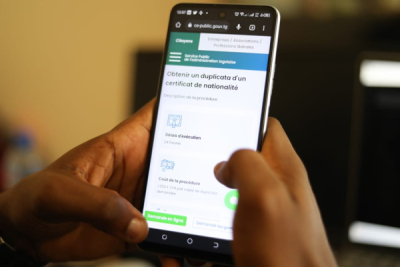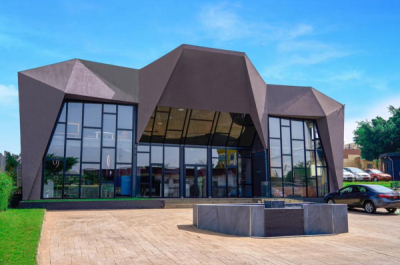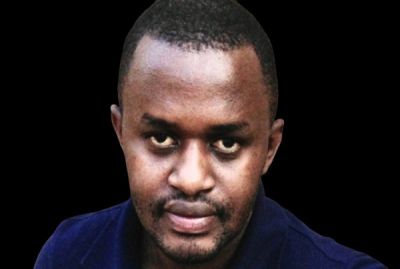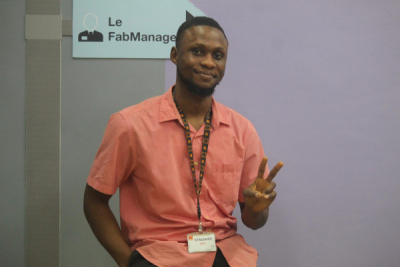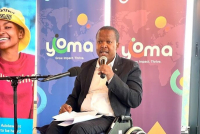British fintech company Wise has received conditional approval from the South African Reserve Bank to operate as an authorized foreign-exchange intermediary, allowing it to offer international transfers to consumers.
The approval will enable South Africans to send money abroad at the mid-market exchange rate, with all fees disclosed upfront. The move comes amid rising demand for faster and cheaper cross-border payments in the region.
The D-Prize global competition is accepting applications from African and international entrepreneurs developing solutions to reduce extreme poverty.
Selected startups working in sectors such as health, water, agriculture, energy and education can receive up to $20,000 in seed funding to launch a pilot.
The application deadline is Jan. 4, 2026.
-
Togo integrates three new procedures online: renunciation of nationality, reinstatement of nationality, and modification of patronym or matronym.
-
The national portal now centralises 101 digital public services, including passports, residency cards and nationality certificates.
-
The UN’s 2024 EGDI report ranked Togo 161st out of 193, highlighting a major digitalisation gap the government actively seeks to close.
Togo aims to digitise all public services in the coming years to simplify administrative processes and improve access for all citizens. The addition of new online procedures confirms the progress of this nationwide transformation.
Togo continues to modernise its administration by adding three new services to the national portal service-public.gouv.tg. Citizens can now complete online the renunciation or reinstatement of Togolese nationality and the modification of their patronym or matronym.
The Ministry of Justice and Human Rights leads these digital procedures as part of a methodical modernisation effort. The platform now enables users to complete entire processes remotely: application submission, real-time tracking and receipt of decisions. Officials strengthened the national digital one-stop shop to centralise administrative services and improve accessibility.
This deployment comes as Togo accelerates the digitalisation of administrative services. In recent months, the national portal added major services, including applications for nationality certificates, passport renewals, residence permits, criminal records, construction permits and other formalities. With these additions, the platform now offers 101 online services.
The integration of the three new procedures addresses key priorities: reducing citizens’ travel, increasing procedural transparency, shortening processing times and improving administrative efficiency. The expansion also strengthens administrative inclusion by enabling citizens—especially those far from urban centres—to access essential services without geographic constraints.
This acceleration of digital transformation occurs as Togo works to close a significant gap in public-service digitalisation. The 2024 UN E-Government Development Index (EGDI) assigned Togo a score of 0.3920, ranking the country 161st out of 193, a result that underscores the scale of the challenges ahead. The progress achieved in recent months demonstrates the government’s determination to modernise public administration, improve accessibility and integrate Togo’s public sector into the digital era.
This article was initially published in French by Samira Njoya
Adapted in English by Ange Jason Quenum
-
Enovation Factory and UNDP Cameroon launched Scale 32, a 14-month national programme to support 32 tech startups.
-
The programme provides intensive training, mentorship, workspace access and investor matchmaking, followed by 12 months of alumni support.
-
Cameroon seeks to strengthen its technology ecosystem amid low startup survival rates, weak governance and limited access to capital.
Cameroonian startups continue to struggle to attract investment as limited managerial expertise and weak ecosystem structuring hinder their growth. Observers argue that targeted support remains essential to improve competitiveness and unlock financing opportunities.
Enovation Factory, a Cameroon-based incubator and accelerator, launched in partnership with UNDP Cameroon a national 14-month initiative named Scale 32. The programme aims to support 32 technology startups by addressing their main barriers to growth, including access to capital, management skills and investor networks.
The programme unfolds in two phases. The first cohort will receive six months of intensive support from January to June 2026. The second cohort will benefit from a similar cycle from June to December 2026.
Enovation Factory will integrate selected startups into one of its two streams: Newbie, which targets early-stage or ideation-level projects, and Cracker, which targets operational startups seeking accelerated growth. The support package includes specialised training, mentorship, workspace access and connections with institutional partners and investors.
Enovation Factory will transition each startup into its Alumni programme after the six-month support phase. The incubator will provide an additional 12 months of follow-up, which includes access to its network, financing opportunities and major ecosystem events. The structure aims to ensure that each company consolidates the skills and gains achieved during the programme.
The initiative comes as Cameroon seeks to fortify its technology ecosystem and stimulate job creation. Policymakers attempt to complement existing sector-building efforts by addressing low startup survival rates and the weak governance that affects many early-stage companies.
However, challenges persist. The small volume of capital raised by local startups, the limited number of firms able to attract investors and the region’s low share of venture-capital flows underscore the need for deeper structural reforms. Analysts stress the need to strengthen corporate governance, improve investor appeal, reinforce institutional support and enhance the visibility of Cameroonian startups on the global stage.
Startups operating in technology, agritech, healthtech, fintech, edtech, green economy and other innovative sectors may apply before 18 December via the link provided by Enovation Factory: https://www.enovation-factory.com/postuler.
This article was initially published in French by Samira Njoya
Adapted in English by Ange Jason Quenum
-
PeerPesa, founded in 2020, uses Celo blockchain and stablecoins (cUSD, CELO) to enable cross-border money transfers across Africa.
-
The platform relies on a peer-to-peer liquidity model with local traders to convert stablecoins into national currencies.
-
PeerPesa targets faster, cheaper, mobile-based transfers to improve financial inclusion for unbanked populations.
Mwambutsa Edgar, a Kampala-based technology entrepreneur and co-founder of PeerPesa, serves as the company’s chief executive. PeerPesa operates as a cross-border payment and money transfer platform that enables users to send funds to mobile wallets and bank accounts by relying on blockchain infrastructure.
PeerPesa, founded in 2020, positions itself as a P2P remittance and payment service dedicated to African markets. The company aims to connect Africa to international corridors by offering faster and low-cost transfers. It promotes financial inclusion by giving remote users access to DeFi-based tools outside traditional banking networks.
The platform seeks to remove common barriers in international transfers, such as high fees, long delays and complex banking routes. It uses stablecoins backed by strong currencies to provide predictable and lower-cost transfers completed via mobile phones.
PeerPesa uses the Celo blockchain and stablecoins like cUSD, along with the CELO token, to facilitate fund transfers to several African countries. The company executes transactions through a peer-to-peer model built on local traders who guarantee liquidity between crypto assets and national currencies.
Recipients can obtain funds directly in a bank account or mobile-money service, aligning with entrenched African practices such as M-Pesa. The use of blockchain ensures transaction traceability, while smart contracts reduce reliance on financial intermediaries.
Before PeerPesa, Mwambutsa co-founded Coinpesa in 2016, a digital-assets platform focused on expanding cryptocurrency access. The company states that it wants to broaden the use of these financial tools to support global financial inclusion.
Mwambutsa graduated from Makerere University in 2006 with a bachelor’s degree in quantitative economics. He later obtained an MBA in 2019 from the Edinburgh Business School at Heriot-Watt University in Scotland. He began his professional career in 2006 at Uganda’s National Social Security Fund, where he served as a relationship officer.
This article was initially published in French by Melchior Koba
Adapted in English by Ange Jason Quenum
-
Awahnji Jean Awah pursues a Master’s in Data Science and AI while completing extensive multi-vendor certifications across IBM, Meta, Google, AWS, Azure, Red Hat and others.
-
Orange Digital Center (ODC) trains him through its partnership with Coursera, signed in April 2024, offering hands-on programmes and continuous mentorship.
-
He applies his skills in freelance development and AI practice, gaining better-paid missions, higher responsibilities and increased client trust.
Cameroonian developer Awahnji Jean Awah builds digital solutions and moves toward cloud technologies and artificial intelligence. He pursues a Master’s degree in Data Science and Artificial Intelligence at the Institut universitaire de la Côte, where he acquires scientific and practical foundations in these fields.
Alongside his academic programme, he trains himself through web development, data-analysis projects and website creation for clients. This autonomous work allows him to test his skills against concrete business needs.
With the goal of becoming “an end-to-end AI engineer capable of designing high-impact digital solutions,” Awahnji joins the Orange Digital Center (ODC), Orange’s technology-training hub. He follows several programmes created through an April 2024 partnership between ODC and Coursera, which he discovered on social media.
He completes certifications from IBM (DevOps, Software Engineering, Machine Learning, AI Developer), Meta (Back-End and Front-End Developer), Google (UX, Data Analytics, Project Management), AWS (Cloud Architect), Microsoft Azure (Developer), Red Hat (Kubernetes/OpenShift), Microsoft (Project Management, Cloud Support), Scrum Master, and additional technical modules.
This training path, which began in July 2024 and continues throughout 2025, relies on an intensive schedule that combines practical workshops, ODC staff mentoring and professional simulations. In an interview with We Are Tech Africa, he describes the experience as “rich, practical, intuitive, well supervised by the ODC staff.”
In parallel, he works as a freelance developer and AI practitioner, a framework that allows him to apply his newly acquired skills. He says that the certifications have “strengthened my portfolio, improved my technical autonomy, increased my opportunities for freelance missions and enhanced my professional credibility.”
He states that they have transformed his “skills, strengthened my confidence and given me the tools needed to turn my ideas into real and impactful solutions.” He adds that this evolution results in “better-paid missions, more responsibilities and greater client trust.”
Looking ahead, Awahnji plans to “become a certified AI and cloud engineer, design impactful AI tools, develop scalable cloud solutions and, ultimately, create or join a technology start-up.”
This article was initially published in French by Melchior Koba
Adapted in English by Ange Jason Quenum
- Orange Sierra Leone inaugurated a €23 million ($26.7 million) backup datacenter in Bo.
- The company invested $50 million to modernise its network, now fully 4G- and 5G-compatible.
- Orange Sierra Leone controls 51% of the mobile market with 3.04 million subscribers.
Orange Sierra Leone continues to scale its network infrastructure as the market leader. The company recently announced that it invested $50 million to modernise its nationwide telecom network.
Orange Sierra Leone inaugurated a new datacenter on 29 November in the southern city of Bo. The company built the facility for €23 million ($26.7 million) as an identical replica of its main datacenter in Freetown. The operator says the new site will function as a disaster-recovery hub to prevent emergencies, outages or natural disasters from disrupting digital services across the country.
The company highlighted the strategic location of the site. “Strategically located in the south of the country, the new centre contributes to extending digital infrastructure to rural and regional communities, particularly in the southern and eastern corridors toward Makeni, Kono and Kenema. It will enable better distribution of network traffic and improve connectivity in underserved areas,” Orange said in a statement posted on Facebook on 30 November.
The operator built the datacenter as Freetown remains exposed to landslides such as the 2017 event and as the country continues to face recurrent flooding. The backup site aims to ensure service continuity if such disasters threaten the capital.
The inauguration aligns with Sierra Leone’s broader digital-transformation agenda. Telecom services now support daily activities for businesses, households and public administration. Communications Minister Salima Bah stressed the importance of uninterrupted service after a brief outage in August 2024. “The Internet has become an indispensable tool in our daily lives. If the connection were interrupted, everyone would realise how much we depend on it,” she said. She added that the government and telecom operators have made significant investments to prevent future disruptions.
Beyond the new datacenter, Orange Sierra Leone operates 616 telecom sites nationwide, including 40 recently deployed sites. The company powers 70% of those sites with green-energy sources. Orange also invested $50 million to modernise its entire network, which now supports full 4G and 5G capability.
The GSMA argues that these upgrades should strengthen Orange Sierra Leone’s competitive position. The organisation notes that “good quality of service can improve the digital experience and create new opportunities for individuals and the broader community.” By December 2024, Orange Sierra Leone reported 3.04 million mobile subscribers and a 51% market share in competition with Africell and QCell.
This article was initially published in French by Isaac K. Kassouwi
Adapted in English by Ange Jason Quenum
-
Youth unemployment in Lesotho reaches nearly 50% among 15–35-year-olds.
-
The government launched the YOMA digital platform with UNICEF to improve employability and access to skills.
-
Only 48% of the population uses the Internet, which threatens the programme’s adoption.
Lesotho faces one of the highest youth unemployment rates in Southern Africa, with nearly half of young people unable to find work. The government uses digital solutions to expand access to skills, boost employability and create new economic opportunities.
The Ministry of Gender, Youth and Social Development launched the Youth Agency Marketplace (YOMA) on 26 November in Maseru in partnership with UNICEF. The ministry says the platform aims to remove barriers that limit youth integration, including restricted access to training, digital skills and market opportunities.
YOMA operates as a pan-African digital platform that allows young people to acquire skills, receive mentorship and access economic opportunities. It offers pathways ranging from basic training to matchmaking with companies, NGOs and institutions. Users complete social or environmental “impact missions,” which reward them with digital tokens they can exchange for goods or services such as mobile credit or additional training.
The platform records all user activities in a verifiable digital CV, which increases the visibility and credibility of young jobseekers. YOMA aligns with international skills-development standards and uses a personalised approach. It adapts opportunities to each user’s profile, goals and potential while staying linked to labour-market demand.
Authorities say YOMA supports the government’s strategy to empower young people through accessible digital solutions. The stakes are high in a country where youth represent a large share of the unemployed. Official data estimate unemployment among 15–35-year-olds at nearly 50%, one of the highest ratios in the region.
Officials expect YOMA to improve employability, stimulate self-employment, facilitate access to certified training and generate income through paid missions. The platform also seeks to expand digital literacy in a country where young people still lack the tools to participate in a rapidly digitalising economy.
However, weak connectivity threatens uptake. DataReportal estimates that only 48% of Lesotho’s population used the Internet at the start of 2025, while mobile data costs remain high relative to average income. Rural areas face unstable mobile coverage, which limits access to a fully digital platform. YOMA’s success depends on stronger connectivity, lower access costs and broader awareness campaigns.
By launching in Lesotho, YOMA adds to deployments already underway since 2020 in Benin, Burundi, Côte d’Ivoire, Kenya, Nigeria and South Africa. The partnership with UNICEF allows Lesotho to rely on a tested model to broaden access to training, economic opportunities and entrepreneurship.
Samira Njoya
NBA Africa has selected ten startups from five countries for the second edition of its Triple-Double program, which supports young technology ventures in sports and the creative industries. The selected companies include Athlon Technology and Fitclan (Egypt), Novate and Reborn (Morocco), ProPath Sports and Safia Health (Kenya), and Contestify, Atsur and SongDis (Nigeria). They are scheduled to pitch their projects in Kigali on Friday, December 5.
Bolt, the ride-hailing platform, has reached a major milestone in South Africa, announcing it has completed more than 400 million trips since its launch in 2016. The service, which serves about 1.4 million passengers each month and has over 40,000 active drivers across twenty-three cities, hit this mark as the industry rolled out new safety rules requiring licenses, vehicle identification and physical alert buttons.
More...
-
iFunza enables teachers to share real-time academic updates with parents via web and mobile platforms.
-
The app has surpassed 5,000 downloads on Android and targets both urban and rural families with low-data, low-spec features.
-
Schools use iFunza to reduce administrative costs and digitize communication and student-performance tracking.
iFunza aims to position itself as a new tool for academic support in Kenya. The application seeks to reinforce collaboration between teachers and parents to monitor student performance more efficiently.
The Kenyan edtech start-up developed iFunza as a web and mobile platform that allows teachers to share grades, assignments and observations in real time. Parents can access their children’s academic records instantly, regardless of their location.
Caroline Ndiangui and Martin Kariithi launched iFunza in 2019. The application operates on iOS and Android and has recorded more than 5,000 downloads on Play Store.
The app streamlines communication between schools and households. Automatic notifications inform parents of homework, absences or lateness, while teachers can send personalized messages to highlight academic challenges or congratulate progress. A centralized dashboard provides a clear view of student development, which enables faster and more tailored academic support.
iFunza works on low-spec smartphones and consumes limited data. The design targets families in both urban centers and rural areas. In a country where personal computer ownership remains limited, iFunza offers an accessible alternative that aligns with Kenya’s digital reality.
The platform helps schools reduce administrative expenses linked to manual report cards, parent notices or communication management. iFunza digitizes school administration and rationalizes pedagogical monitoring by making information accessible online, rapidly and securely.
In a context where education outcomes and student monitoring are major development priorities, iFunza can help improve academic achievement, strengthen accountability among parents, teachers and learners, and foster continuous dialogue around learning.
This article was initially published in French by Adoni Conrad Quenum
Adapted in English by Ange Jason Quenum
-
The Interior Ministry launched a national digital platform allowing Algerians to file online declarations for lost, stolen or destroyed official documents and obtain certified electronic attestations.
-
The police recorded 1.3 million loss declarations in 2024 and an additional 1.5 million in 2025, pushing authorities to adopt a digital system capable of managing surging demand.
-
The initiative forms part of Algeria’s plan to raise the digital sector’s GDP contribution to 20% by 2030 through online public services and technological modernization.
Algeria moves decisively toward digital transformation as it aims to increase the sector’s contribution to GDP and modernize public services by 2030. Authorities place the rollout of new electronic platforms at the center of this strategy.
Interior Minister Saïd Sayoud officially launched on 27 November in Algiers the national digital platform for declarations of lost documents. Authorities present the system as a key component of the state’s digital transformation agenda that seeks to modernize procedures, ease administrative burdens for citizens and improve the efficiency of public security services.
Engineers at the General Directorate of National Security (DGSN) developed the platform. The system allows any citizen to declare online the loss, theft or destruction of an official document — including identity cards, passports or driving licenses — and to immediately obtain a certified electronic attestation.
The platform remains accessible 24/7 via the police website. It manages data entry and request tracking, integrates automated verification mechanisms to curb abuses and builds a centralized database to identify multiple declarations. Developers designed the system to improve access for people with special needs and residents in remote areas.
The DGSN states that the platform responds to a real operational need. Authorities recorded 1.3 million declarations of loss in 2024 and another 1.5 million since the start of 2025. This growing volume justifies the shift toward a digital system that can streamline procedures, shorten processing times and reduce the administrative workload on police services.
This innovation aligns with Algeria’s broader digital transformation strategy promoted at the highest level of the state. The government aims to raise the digital sector’s contribution to 20% of GDP. The objective depends on expanding online public services, modernizing technical infrastructure and supporting local innovation.
Officials view the new platform as a continuation of reforms already underway, including the introduction of biometric driving permits, digital vehicle registration cards and new secure DGSN services.
Beyond efficiency gains, authorities expect the platform to improve administrative accessibility for remote or vulnerable populations. The tool enables citizens to complete procedures remotely, reduce travel needs and limit printing-related costs.
However, several challenges remain for the reform to deliver its full impact. The government must protect personal data, ensure the reliability of verification systems to prevent fraud, educate citizens on digital tools and maintain sustained technical and institutional support.
This article was initially published in French by Samira Njoya
Adapted in English by Ange Jason Quenum
-
Dashy integrates the entire sales cycle — from chat to payment — inside WhatsApp through a unified dashboard launched in 2024.
-
The platform’s Pay-by-Link and SoftPOS features allow businesses to collect payments directly inside WhatsApp conversations or via smartphone terminals.
-
Dashy automates customer interactions with AI-driven workflows, routing, catalog synchronization and transaction monitoring.
Imad Moujahid repurposes WhatsApp from a messaging tool into a structured commercial channel. He creates an integrated space where each exchange between clients and companies can lead directly to a transaction.
Imad Moujahid is a Moroccan entrepreneur active in digital payments and transaction automation. He serves as CEO of Dashy, a platform he founded in 2024 that turns WhatsApp into a space for sales, customer support and payments. The tool consolidates every step of the commercial cycle into a single dashboard to match the platform’s massive adoption across daily communication.
Dashy centralizes all customer conversations and links them to operational workflows. Businesses manage clients, product catalogs, orders and payments without switching between interfaces. The system groups all exchanges into one inbox that supports message assignment, internal note-taking and full interaction histories. The platform aims to ensure companies process all requests and avoid unresolved discussions.
Payments anchor Dashy’s system. The Pay by Link feature generates a secure payment link sent directly inside a WhatsApp chat. Clients complete payments without additional apps or devices. For in-person transactions, Dashy offers a SoftPOS feature that turns a phone into a payment terminal, which reduces the steps between purchase intent and completed transaction.
The platform also operates as a connected back-office. Companies create or import product catalogs and synchronize them with order tracking. Dashy automates the delivery of information to clients, even during peak periods. The Flow Builder enables businesses to design AI-powered conversational scenarios that answer frequent questions, qualify prospects and deliver first-level assistance at any time. Automated payment reminders, scheduled alerts and skill-based conversation routing complete the ecosystem.
Beyond messaging and payment, Dashy aims to serve as a full commercial back-office linked to WhatsApp. Companies can create or update product catalogs from existing systems or directly inside the platform, then follow orders and automate customer updates throughout busy periods.
Before launching Dashy, Moujahid co-founded and led Finacsys, a provider of credit-management software. He also serves as an associate director at Capdev, a banking-technology consulting firm. He holds a computer engineering degree from Morocco’s École Nationale Supérieure d’Informatique et d’Analyse des Systèmes (ENSIAS).
Moujahid began his career in 2008 as an IT consultant at Veneta Digital Systems. Between 2010 and 2014, he worked as a business consultant for several banks in the Attijariwafa Bank Group, including operations in Gabon, Cameroon and the Republic of Congo.
This article was initially published in French by Melchior Koba
Adapted in English by Ange Jason Quenum
-
Laitify, founded in 2024, deploys sensors, a unified dashboard and QR-code traceability to optimize dairy production from farm to distribution.
-
The system uses real-time data on animal health, milk volume and geolocation to help farmers manage their herds and forecast supply.
-
Laitify integrates AI analytics to generate recommendations on herd management, productivity gains and commercial planning.
Togo positions digital technology as a driver of efficiency in the dairy sector as producers seek tools that structure the journey of milk from breeding to distribution. Medede Bidassa proposes a digital method that documents each step and helps farmers manage their operations more effectively.
Medede Bidassa works as a tech entrepreneur in Togo with the goal of placing digital tools at the service of dairy producers. She co-founded Laitify and serves as its CEO. The company designs technological solutions that improve farm management and strengthen control over dairy production.
Laitify, founded in 2024, deploys a platform that transforms dairy practices from breeding to distribution. The system uses sensors that track in real time the health of cattle, the volume of milk produced and the animals’ geolocation.
The platform consolidates all data on a central dashboard. It displays key indicators for each farm, including production statistics, sales performance and operational metrics.
Laitify also integrates a QR-code traceability system. The tool records each batch of milk into a single database, which facilitates stock control, supply planning and access to production history.
This digital organization enables producers to anticipate their needs, secure the production chain and reduce inefficiencies.
The platform embeds an AI engine that analyzes collected data and generates recommendations. These insights support decisions related to herd management, productivity improvements and commercial planning.
In parallel, Bidassa co-founded Amazing Girls on Tech in 2024, a training program for young women interested in technology careers. She leads its technical training division. She also manages the online community of Tech Communities Day, an initiative dedicated to technology dynamics and collaborative innovation.
Bidassa holds a certification in computing and Internet technologies from the FORCE-N program in Senegal. She currently works as a freelance web developer and serves as team lead for the Google Developers Group in Lomé.
This article was initially published in French by Melchior Koba
Adapted in English by Ange Jason Quenum




